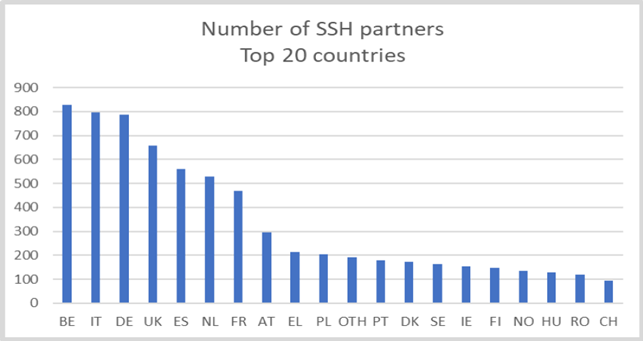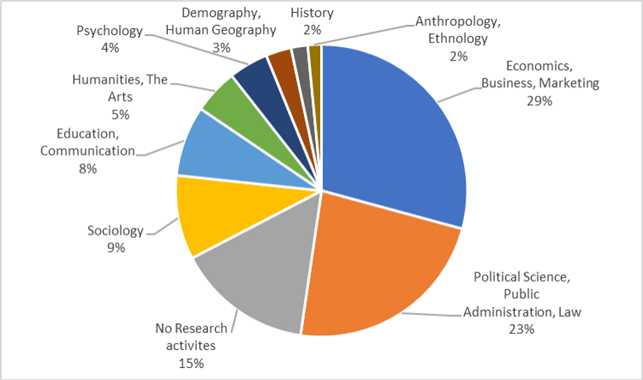
Social sciences and humanities played an important role in the Horizon 2020 programme
The EU’s eighth Framework Programme for Research and Innovation for 2014–2020, Horizon 2020, was replaced by a new iteration already some years ago. However, the old programme is resurfacing as new data was provided by its final research programmes that only ended during 2023. The latest monitoring report presenting a cross-section of the social sciences and humanities in the Horizon 2020 programme was published in November 2023.
The aim of the Horizon 2020 programme was to create jobs and support economic growth through science and research. The integration of social sciences and humanities (SSH) into the whole framework programme with a cross-cutting approach was one of the key features of Horizon 2020. The aim of this integration was to promote the programme’s societal impact. Of its total budget of 80 billion euros, more than one-fifth was allocated to subjects that were SSH-flagged, which means projects that were obligated to include SSH disciplines. The cross-section of social sciences and humanities within the Horizon 2020 programme was analysed in six reports in total.
The final monitoring report presents the quantitative and qualitative integration of SHH disciplines across the Horizon 2020 programme throughout the whole programming period. However, this blog concentrates on just one of the three pillars in the programme: the Societal Challenges pillar. The analysis of the degree of integration provides information about how successful SSH disciplines were in general and in certain countries, and how well certain disciplines fared. The report presents the SSH disciplines through their programme budget and SSH collaboration partners, as well as the disciplines involved in the implementation of the projects. The objective of the report is to gather information about how the SSH disciplines succeeded in the Horizon 2020 programme. Additionally, the report will aid in monitoring the current Horizon Europe programme and support the integration of SSH into future framework programmes.
The report lists the projects that had SSH-flagged topics and SSH partners. It counts consortium partners as SSH partnerships if at least 66 per cent of experts had expertise in SSH disciplines. In addition, there may be projects that included an important SSH aspect. Among the SSH-flagged projects funded within the Horizon 2020 programme, 71–86 per cent had SSH partners. According to the report, 90 per cent of the SSH partners came from EU member states. The six countries with the most prominent SSH representation (in order of magnitude) were: Belgium, Italy, Germany, Great Britain, Spain and the Netherlands.

Figure 1. Top 20 countries according to number of SSH partnerships. Source: Integration of social sciences and humanities in Horizon 2020 – Participants, budgets and disciplines 2014–2020: final monitoring report.
SSH projects in special focus
The Societal Challenges pillar of the Horizon 2020 programme included seven parts:
- SC1: Health, Demographic Change and Wellbeing (health challenge)
- SC2: Food Security, Sustainable Agriculture and Forestry, Marine, Maritime and Inland Water Research and the Bioeconomy (food challenge)
- SC3: Secure, Clean and Efficient Energy (energy challenge)
- SC4: Smart, Green and Integrated Transport (transportation challenge)
- SC5: Climate Action, Environment, Resource Efficiency and Raw Materials (climate challenge)
- SC6: Europe in a Changing World – Inclusive, Innovative, and Reflective Societies (societal challenge)
- SC7: Secure Societies – Protecting Freedom and Security of Europe and its Citizens (security challenge).
One of the listed challenges, namely the societal challenge, consisted almost solely of SSH projects. Over 40 per cent of the projects in both the climate and security challenges were also SSH-flagged, whereas the transportation challenge included only 13 per cent SSH projects.
The report also assesses the quality of the SSH-flagged projects. It looks at the share of the budget allocated to experts in SSH disciplines and the role they had in the project. More than half of the SSH-flagged projects included integration evaluated as good. The level of SSH integration was highest in the societal, climate and security challenges and lowest in the disciplines within the health challenge.
Around 7 per cent of the budget of 30 billion euros granted to SSH-flagged topics was allocated to SSH partners. Projects with SSH partnerships were funded especially in the disciplines within the societal challenge as well as the health and food challenges. Disciplines with most funding allocated to SSH partnerships were economics, business and marketing, and political science, public administration and law. There is a significant distinction between the represented fields in social sciences and humanities. Both the funding for and partnerships with SSH fields were distinctly more prominent in social sciences.

Figure 2. Discipline prevalence of SSH partners in projects (SSH-flagged topics). Source: Integration of social sciences and humanities in Horizon 2020 – Participants, budgets and disciplines 2014–2020: final monitoring report.
Finland in the monitoring report comparison
In the report comparison, Finland is ranked 16th when looking at the number of SSH partners. Finland’s SSH integration increased somewhat compared to the previous framework programme. There is a significant difference in the status of Finnish researchers: 17 projects in the Horizon 2020 programme had Finnish PIs. Seven of these were under the societal challenge and five under the food challenge. In the previous framework programme, only nine projects had Finnish PIs.
The share of Finnish partners among the SSH partnerships was around 2 per cent within each challenge. The highest shares were in the societal and climate challenges, whereas the lowest was in the energy challenge. There is a clear distinction between Finland and Austria when comparing Finland and its peer countries (Ireland, Austria, Sweden, Denmark and Norway). Austria ranked higher than Finland in every challenge, most significantly in the energy challenge. Norway, Sweden and Ireland had approximately the same rank as Finland, whereas Denmark ranked both above and below Finland.
The report’s conclusion names promoting the societal impact of research as the future objective in EU research, which may be achieved especially through multidisciplinarity. The report clearly indicates that SSH integration matters. However, the report does not offer an explanation to the differences in the level of SSH integration between different countries, although it may offer some idea of the ongoing trends. Indeed, the differences between Finland and Austria were especially interesting, raising questions about what we could learn from the Austrians in promoting the status of SSH disciplines.
- Read the whole monitoring report: Integration of social sciences and humanities in Horizon 2020 – Participants, budgets and disciplines 2014–2020: final monitoring report